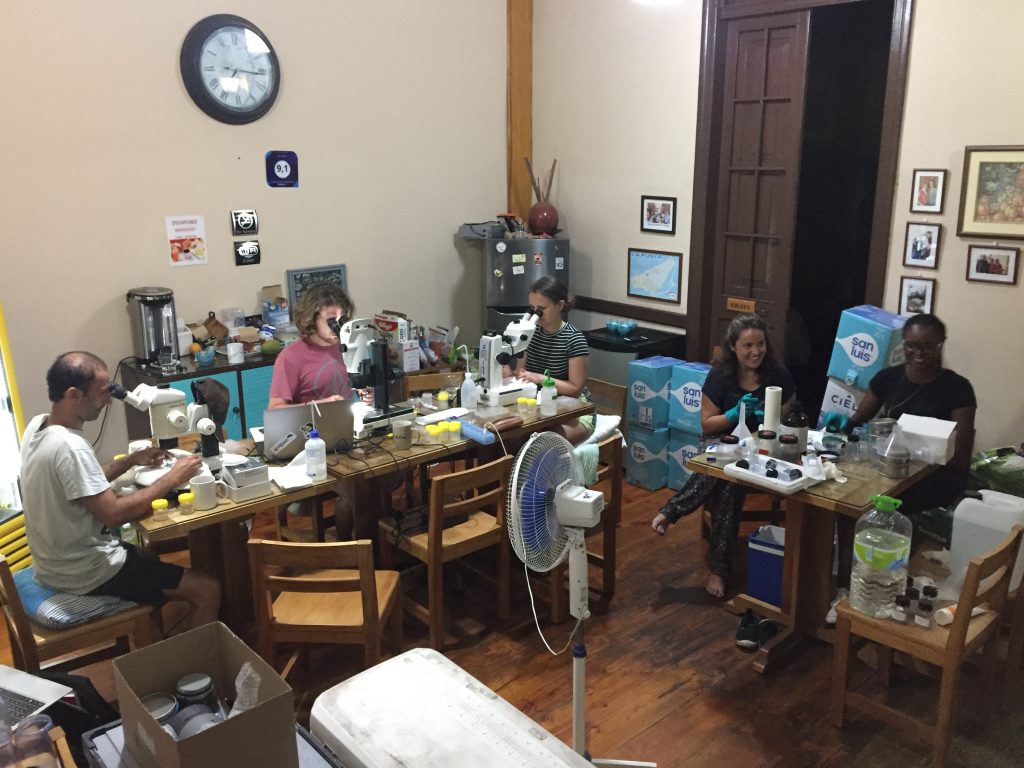I started writing this blog post on t15, the day of the deep-water addition. I had some thoughts that I needed to write down. Yet, I never found the time to go over the post again, to make it publishable. Shortly after t15, COVID-19 hit Peru. I want to put the thoughts that I had halfway through the experiment, before we knew how this pandemic was going to affect the world, into perspective.
t15: It’s 10 pm and we are driving out to the mesocosm field to deliver a box that had falsely been brought back to our base, but which is essential for the operation deep-water addition to continue. The guys and girls who are out there at the mesocosms are sitting in the dark with only one of the boats shining a light onto the site. It’s wavy and wet. Their task: pumping water out of all mesocosms that are receiving the low light treatment – four in total – and pumping back the same volume of deep-water. That equals out to about 30,000 liters of water in this treatment. It’s a very long task. They have already been out there for hours and still more work to do. My task isn’t all that special. But I too have been up for a very long time, I had sampled the mesocosms early in the morning and later sat at the microscope for 12 hours. I was tired, I was hungry, I was ready to go to sleep. Yet, I didn’t hesitate a second when they needed a second person to go out on one of the boats to deliver this very important box. While Carsten is driving and I am looking out to the moon above Lima behind us and Isla San Lorenzo in front of us, I have to think about the lengths we go to as scientists to make sure an experiment runs smoothly. We set aside everything that seems like the logical thing to do – eat, sleep, rest – to make sure that the data we produce are of highest possible quality. To make sure that what we are doing has a meaning. That we understand a tiny bit more about nature’s many wonders. This desire in us seems so large, that we are willing to do whatever it takes. To me, this is what makes a career in science the path I want to pursue. It might be a romanticized view of what expects me in the future. But this romantic view of anything and everything for science is what makes us scientists the way we are. It’s what makes us seem like an alienated species to other people. People who would never put personal things aside for work. For us, work is not a 9-to-5. For us, work is exciting. Our work gives us meaning. In the end, science tries to explain the world. How could it not be meaningful?

Today is t35, the last sampler. We made it until the end even though at times, it seemed impossible. Before the experiment started, we were all so anxious. Anxious to work, anxious to start sampling, anxious for data to come in. Now, we are anxious as to what is going to happen with us, with Peru, with the world. These times are hard on everyone. Times are different. Strange. Yet, what remains is the knowledge that the scientists in us never gives up. Travelling halfway across the world for an experiment of this magnitude just to be held off for days and days on end by customs, for everything to run smoothly for a few weeks and finally for everything to be halted, to be adjusted, to be reduced by COVID-19.

I started writing about how we put everyday-life necessities on hold for science. How we ignore basic human needs for a while when things get exciting, when we’re out on the water, when we’re processing our samples in the lab. Today, this pandemic puts things into perspective. Today, it is not just about not eating, sleeping, resting. Today, it is about how we managed to finish this experiment – even though in a reduced manner – despite what is going on out in the world. It seems to me that filling our days with meaning, continuing the work we came here to do, has given us all a sense of purpose, a sense of direction in these challenging times. I am grateful for this experience. Grateful to be able to perceive this crisis through a different vantage point. I am certain it will make us grow. And in the end, we can say we have given anything and everything for science.
Anna Fiesinger